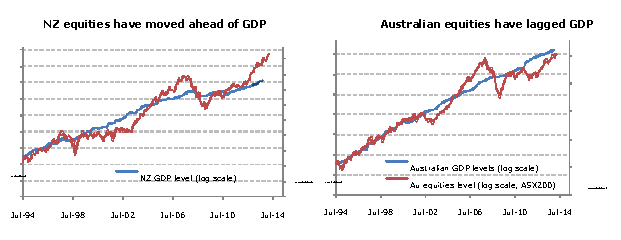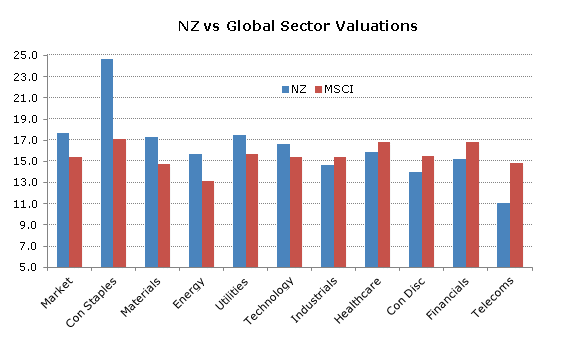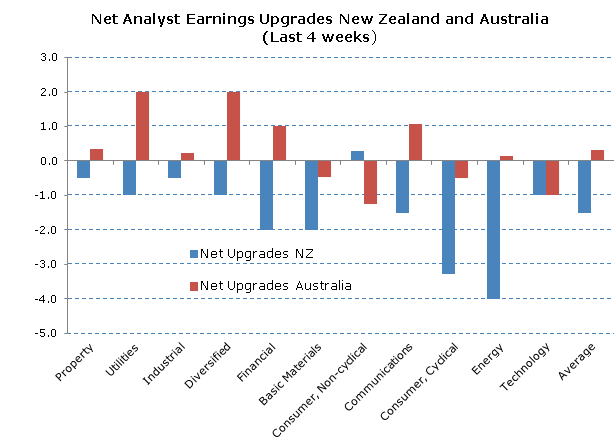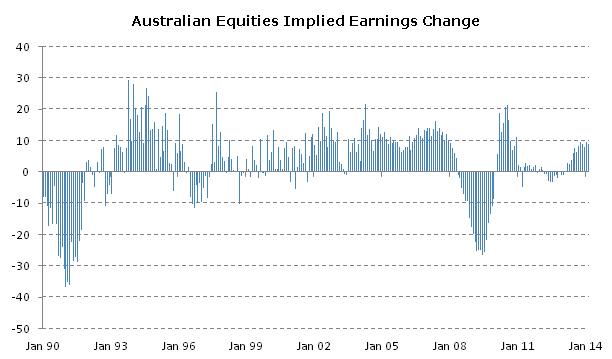Can conditions get better for NZ equities?
Friday, April 18th 2014, 12:30PM
by Harbour Asset Management
In the short term the New Zealand equity market might take a breather. There are signs that the market is ‘losing breadth’, although we doubt that is a robust measure to judge the outlook. Typically equity markets follow GDP growth trends, and New Zealand GDP growth remains robust. Over the medium term New Zealand equity returns have been nicely tied to GDP growth because company revenue prospects, margins and corporate profits are closely related to how well the economy is performing.
Figure 1: The equity market eventually follows economic growth

Source: Harbour, Bloomberg
With NZ economic growth set to improve further, the equity market has continued to ride high. However the equity market is also affected by the outlook for inflation, interest rates and expectations of profits. We need to ask what is ‘baked-in’?
The key factor that generally stops an equity bull market is unanticipated inflation – when a Central Bank has no choice but to unexpectedly place the brakes on. Unexpected inflation is negative because real interest rates need to rise more sharply, companies often find unexpected price rise hit margins, and economies tend to slow sharply as a combination of a rise in household savings, falling investment and a negative inventory cycle all come together in a hurry. Investors often also pull funds out of both fixed income and equity markets, and equity valuations fall.
Rising inflation expectations generally provide a warning shot for investors.
However at the moment whilst some NZ inflation data is trending upwards – the warning shots are not alarming and to-date the market seems to think that the path of interest rates provides enough potential withdrawal of stimulus . Moreover global inflation data is benign.
Anticipated interest rate rises may impact equity returns through a higher cost of capital and perceptions of lower economic growth. However the evidence is that past interest rate cycles have not greatly impacted aggregate equity returns, rather they impact relative sector returns with defensive and utility stocks more highly correlated to rising interest rates in the first instance.
First NZ Capital found that average and median returns for NZ equities have been 4.8% and 3.9% respectively in the six months after a tightening cycle has started . This followed an on average 9% rise in the market in the 6 months before. The historic evidence again is not yet alarming, and while investors may become cautious, the fact that a tightening cycle has started is not of itself a worrying development.
The market currently expects a long tightening cycle – drawn out over 24 months – and increases of almost 200 basis points. This would compare to the January 2004 to December 2005 cycle when rates rose 225 basis points. The NZ equity market rose 13% in the subsequent 6 months and 36% in total over the rate rise cycle in that 2 year period. While no two cycles are the same – it is hard to draw significantly bearish signals as yet from the potential interest rate cycle.
Generally speaking, if central banks foreshadow rate rises and growth continues, albeit at a slower pace, equities still provide positive returns.
With neither an inflation nor interest rate shock yet in sight, a further test for the market is how far ahead the market might be valuing earnings.
The NZ equity market has continued to push into overvalued territory on most measures of valuation, and certainly relative to global and the Australian markets. Most commentators now see better ‘value’ in overseas equities.
Figure 3: Increasing signs of over-valuation in New Zealand

Source: Forsyth Barr.
However, valuations can continue to become significantly more stretched, and valuations as an indicator often provide little guidance for turning points in absolute or relative performance of equity markets.
A more telling indicator is often profit momentum. The extent to which profit forecasts are being revised upwards can signal the positive degree of surprise in the economy and at a corporate level. Actual economic data surprises can also be supportive to equity markets and sentiment.
In recent weeks, while New Zealand economic data has been strong, it has not been stronger than expected. In fact at the margin some data has been a little lower than anticipated. In contrast after 3 months of worse than expected data, economic developments around the world have picked up a little and in Australia several data points have been significantly better.
All this is culminating in better earnings momentum for many companies in Australia at the moment and some deterioration for earnings momentum in New Zealand.
Figure 4: Australian Companies Providing More Positive Surprises

Source: Bloomberg. Analyst upgrades less downgrades for the next two forecast years.
At a sector level figure 4 shows that in recent weeks many of the retailers have reported earnings that have been generally poor with only one or two exceptions. Specifically, Pumpkin Patch and The Warehouse in New Zealand, and Metcash and Myer in Australia, provided updates that saw similar trends and analysts cutting profit forecasts.
Similarly many technology companies have also provided updates resulting in profit downgrades – although earnings may not be the best guide for the technology sector. Of more interest has been the spate of Australian industrial, diversified and financial companies seeing small upgrades to profits, while NZ companies are seeing downgrades across nearly every sector.
Portfolio implication: less New Zealand growth exposure
Although the portfolio continues to tilt to cyclical and growth companies, higher exposures to the Australian economy are a major influence in the portfolio as expressed through our bottom-up stock research. For the first time in 6 years, we have more Australian stocks ‘Buy’ rated in our investment universe.
We have been continuing to reduce positions in many New Zealand ‘growth’ companies including Ryman Healthcare, Auckland International Airport and Synlait Milk. These companies are performing strongly, but in our opinion expectations of analysts are already very high and strong economic growth seems already partly or fully expected in profit forecasts. We have also reduced exposure to Fletcher Building preferring more direct exposures to the Australian building recovery.
Figure 5: Improving Australian Corporate Earnings

Source: Macquarie Research April 2014
In contrast we think a range of Australian stocks have a greater chance of earnings upgrades. For example, Westpac, Lend Lease, Stockland and Seek all have cyclical exposures to an improving Australian economy. In our opinion we do not need to expect a strong lift in economic growth for sentiment to shift in favour of these (and a handful of more globally focussed stocks) relative to the broader New Zealand market.
Andrew Bascand and Craig Stent
Important disclaimer information
| « Learning from investment failure | Sharemarket outlook » |
Special Offers
Comments from our readers
No comments yet
Sign In to add your comment
| Printable version | Email to a friend |









